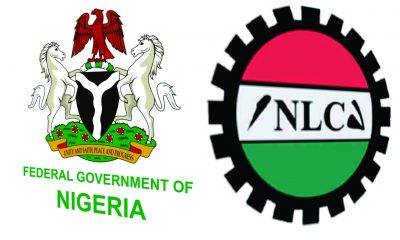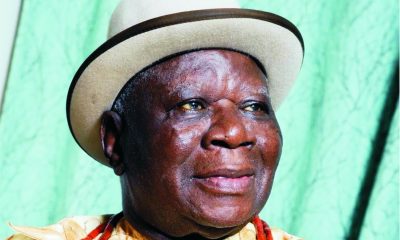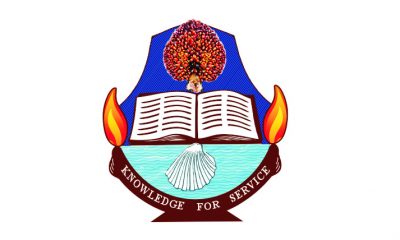Health
Riversman Wins Canadian Award On Health
An indigene of Rivers State and Research Fellow at the Institute of Human Virology, Dr. Sally Nneoma Akarolo-Anthony, has won a Canadian Government grant for innovation in health.
The award is given by Grand Challenges Canada, a Canadian government funded agency which provides grant to 51 innovators in 18 developing countries to pursue bold, creative ideas to tackle health problems in these countries.
The Rivers State born contributed as Principal Investigator of the Active pair Study – a bold and innovative idea which involves the use of modern cell phone based technology and phone apps to combat obesity in Africa and the rest of the world.
Her creativity earned her a special place as she was selected amongst 250 applicants to receive an initial $100,000 grant which will enable her to develop these innovations. Subsequently, she is eligible for an additional scale-up funding of $1 million.
Before the award, the Ikwerre- born medical expert had been discovered by the Rivers State Government during which she was supported to study abroad.
A graduate of the University of Ibadan, Nigeria and the London School of Tropical medicine and Hygiene, Dr Akarolo-Anthony is a Fogarty International Center/National Institutes of Health Research Trainee, working on developing tools for Nutrition Epidemiology research in Nigeria and is currently doing a post-doctoral at the Harvard School of Public Health, Boston Massachusetts, where she is studying the role of nutrition in non-communicable diseases, such as stroke.
WHO projects that globally by 2015 about 2.3 billion adults will be overweight; more than 700 million will be obese – an epidemic growing fastest in developing countries and leading to diseases like type 2 diabetes, cancers, cardiovascular disease, hypertension and stroke.
In Nigeria, where mobile phone use is now common (use in Nigeria rose almost 1,300% in 2010 – 11), health researchers led by Dr. Akarolo-Anthony will work with a high-tech firm to create a smart phone app to provide a virtual mentor and online buddy system.
Some functions of the app include computation of user’s metabolic rate and caloric requirement, offer healthy diet tips, estimation of daily calorie intake required to meet a weight-loss goal, and monitoring of change over time.
Health
‘How Micro RNA Research Won Nobel Prize’
Two United States scientists who unraveled the human micro RNA have won the Nobel Prize in Physiology or Medicine 2024.
Victor Ambros and Gary Ruvkun won the coveted prize for their work on microRNA as their discoveries help explain how complex life emerged on earth and how the human body is made up of a wide variety of different tissues.
MicroRNAs influence how genes – the instructions for life – are controlled inside organisms, including humans.
Every cell in the human body contains the same raw genetic information, locked in our DNA.
However, despite starting with the identical genetic information, the cells of the human body are wildly different in form and function.
The electrical impulses of nerve cells are distinct from the rhythmic beating of heart cells. The metabolic powerhouse that is a liver cell is distinct to a kidney cell, which filters urea out of the blood.
The light-sensing abilities of cells in the retina are different in skillset to white blood cells that produce antibodies to fight infection.
So much variety can arise from the same starting material because of gene expression.
The US scientists were the first to discover microRNAs and how they exerted control on how genes are expressed differently in different tissues.
The medicine and physiology prize winners are selected by the Nobel Assembly of Sweden’s Karolinska Institute.
They said: “Their groundbreaking discovery revealed a completely new principle of gene regulation that turned out to be essential for multicellular organisms, including humans.
“It is now known that the human genome codes for over 1,000 microRNAs.”
Health
WHO Begins Regulation On Antibiotic Waste
The World Health Organisation (WHO) has begun acting to curb effects of antibiotic pollution.
The new guidance on wastewater and solid waste management for antibiotic manufacturing sheds light on this important but neglected challenge ahead of the United Nations General Assembly (UNGA) High-Level Meeting on antimicrobial resistance (AMR) taking place on 26 September 2024.
The emergence and spread of AMR caused by antibiotic pollution could undermine the effectiveness of antibiotics globally, including the medicines produced at the manufacturing sites responsible for the pollution.
Despite high antibiotic pollution levels being widely documented, the issue is largely unregulated and quality assurance criteria typically do not address environmental emissions. In addition, once distributed, there is a lack of information provided to consumers on how to dispose of antibiotics when they are not used, for example, when they expire or when a course is finished but there is still antibiotic left over.
“Pharmaceutical waste from antibiotic manufacturing can facilitate the emergence of new drug-resistant bacteria, which can spread globally and threaten our health. Controlling pollution from antibiotic production contributes to keeping these life-saving medicines effective for everyone,” said Dr Yukiko Nakatani, WHO Assistant Director-General for AMR ad interim.
Globally, there is a lack of accessible information on the environmental damage caused by manufacturing of medicines.
“The guidance provides an independent and impartial scientific basis for regulators, procurers, inspectors, and industry themselves to include robust antibiotic pollution control in their standards,” said Dr Maria Neira, Director, Department of Environment, Climate Change and Health, WHO. “Critically, the strong focus on transparency will equip buyers, investors and the general public to make decisions that account for manufacturers’ efforts to control antibiotic pollution.”
Health
Kebbi Harmonises Doctors’ Salaries To Curb Brain Drain
In a concerted effort to curb brain drain, the Kebbi State Government has harmonised medical doctors’ salaries to be at par with their colleagues in the federal government’s tertiary health facilities.
Kebbi State Commissioner for Health, Musa Inusa-Isma’il, disclosed this at the handing over of ambulances to the state-owned health facilities at the Ministry of Health in Birnin Kebbi yesterday.
Inusa Isma’il, according to a statement by Ahmed Idris, the Chief Press Secretary to the governor, said the essence of the harmonisation was to retain the existing medical doctors and attract more to the services of the state.
According to him, the doctors across the state had already started enjoying the new salaries from August 2024.
He said the release of the vehicles was in fulfilment of Governor Nasir Idris’ promise to uplift health care services in the state.
“His Excellency said I should inform you, the beneficiaries of this gesture, that the vehicle should be strictly used for the intended purpose. It should not be used for anything else.
“If there is no referral case, each of the vehicles must be parked at the hospital by 6 pm. The governor said you should warn your drivers against reckless driving as well as violating the instructions.
“We should also do everything possible to reciprocate the gesture by working according to the terms and conditions attached,” he advised.
The benefiting health facilities included Sir Yahaya Memorial Hospital, Birnin Kebbi; State Teaching Hospital, Kalgo; General Hospital, Argungu; General Hospital, Yauri; General Hospital, Zuru; and General Hospital, Bunza.
In his speech, the permanent secretary of the ministry, Dr Shehu Koko, recalled that the ambulances were handed over to the ministry last Friday by the governor for the onward handover to the benefiting hospitals.
He observed that the ambulances would go a long way in improving the referral system in the state, adding that delays in reaching the secondary and tertiary facilities would be eliminated.
The permanent secretary attributed the high rate of maternal mortality in the country to delays in getting to the health facilities for proper medical care.
“We believe with the provision of these ambulances, part of the gaps we have in our referral system will be addressed, whereby patients who require secondary healthcare could be easily transported to secondary and tertiary health centres, where they can get such help,” he said.
In a goodwill message, Commissioner for Information and Culture Alhaji Yakubu Ahmed expressed gratitude to the governor for the support he has given to the ministry to excel.
While advising the beneficiaries to use the vehicles judiciously, the commissioner advised that services and maintenance of the vehicles must be prompt to derive the maximum benefits from the vehicles.
The commissioner also highlighted some achievements recorded by the government in the last year, including beautification of the state capital, completion of a multimillion-naira ultramodern state secretariat, road construction, construction and renovation of classrooms and upgrading of some health facilities, among others.
-
Niger Delta5 days ago
Delta Approves N275bn For 76 Projects Execution
-

 Editorial5 days ago
Editorial5 days agoSolid Minerals, Cesspit Of Corruption
-

 Business5 days ago
Business5 days agoNigeria’s Non-Oil Exports Growth Rises 20.7% To $5.45bn In 2024
-
Politics5 days ago
Diri Renders Stewardship As Jonathan, Others Grace Anniversary Celebration
-

 News5 days ago
News5 days agoFubara Expresses Grief, Commiserates With Family Over Death Of Pa Edwin Clark
-
Business5 days ago
LCCI Urges FG To Reduce Inflation Through Improved Petrol Export
-

 Niger Delta5 days ago
Niger Delta5 days agoUNICAL VC Institutes Scholarship To Reward Academic Excellence
-
Features5 days ago
A Farewell To Arms In Ogoni

